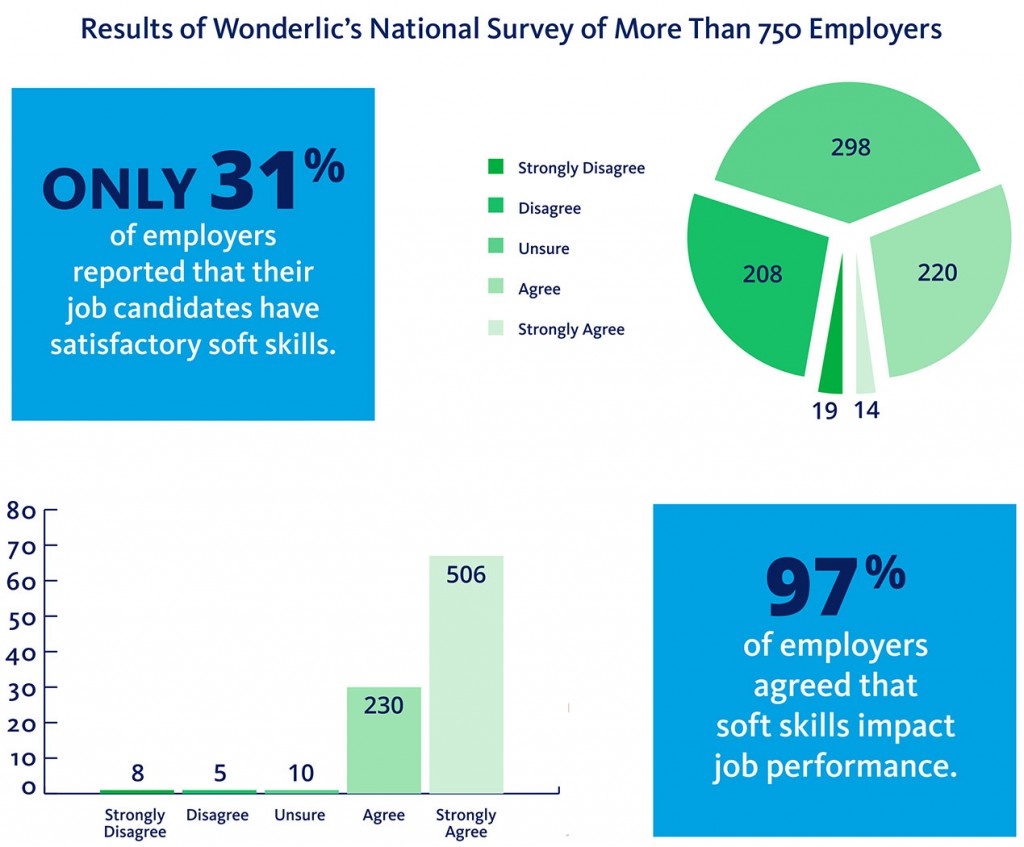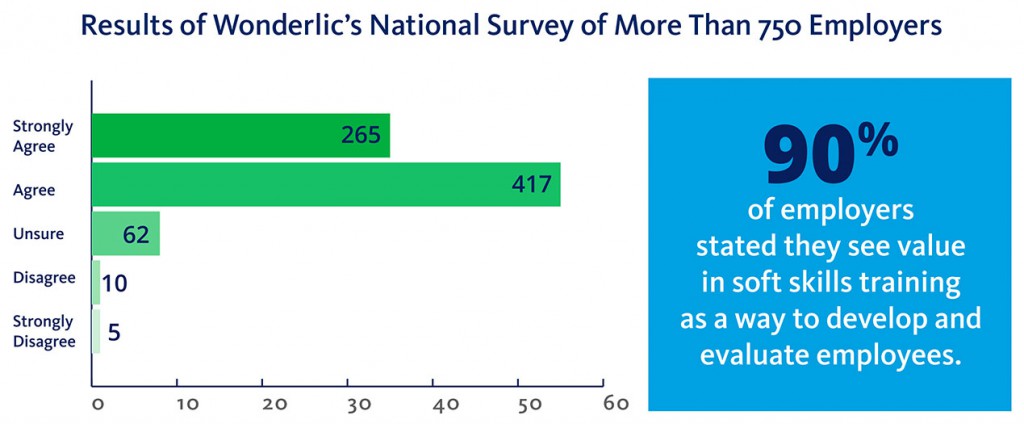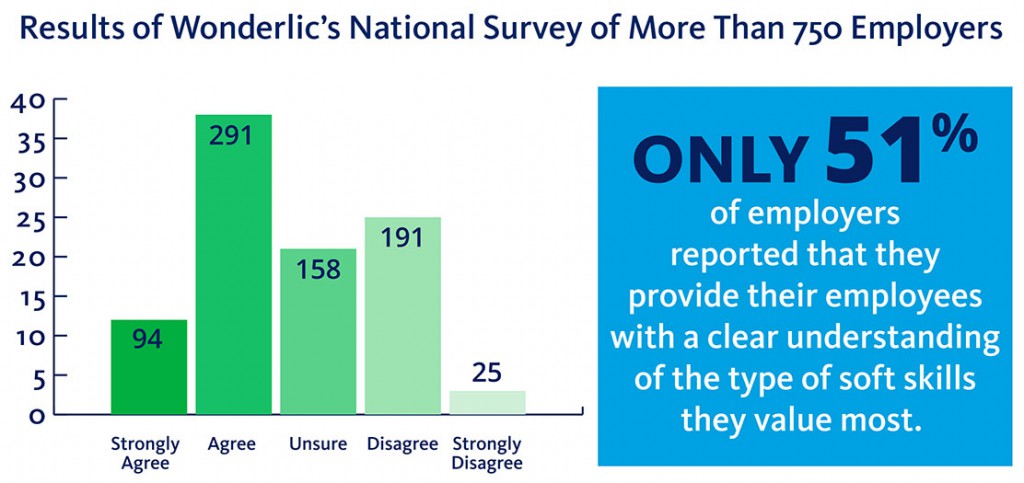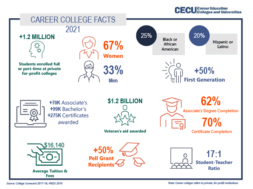
Hard Facts About Soft Skills
Dr. Amanda Opperman, Director of Competency-Based Solutions, Wonderlic, Inc.
Background
When Wonderlic surveyed one hundred employers of Medical Assistants (MAs) about the skills they valued most in their entry-level MAs, the traditional skills one might expect, such as taking and recording vital signs, preparing the examination room, and scheduling patients were near the top of the list, but there was one skill that took the number one spot and surprised Wonderlic’s researchers. This survey found that the skill these employers valued above all else was “proper telephone etiquette.” The fourth skill on the list was “communicating effectively and professionally with patients, co-workers and physicians.”
With telephone etiquette and effective communication taking the first and fourth spots on the list of top skills, the findings of this survey revealed that even in the Medical Assisting profession, which is a highly technical field, soft skills are as important to employers as hard skills.
After giving it some thought, it seems reasonable that soft skills would be critical in a medical setting, where patients can be nervous, impatient, and afraid. But Wonderlic’s researchers wondered, does this trend of soft skills occupying the top of the list also hold true in other fields? The U.S. Department of Education’s Office of Career, Technical, and Adult Education (OCTAE) had an answer: “Employability skills are general skills that are necessary for success in the labor market at all employment levels and in all sectors. These skills have a number of names – soft skills, workforce readiness skills, career readiness skills – but they all speak to the same set of core skills that employers want.”1
You know it when you see it
There are plenty of articles on the internet giving various names to many of the same soft skills, but there is very little consensus about a general definition of the term. According to some, soft skills are personal attributes that allow someone to interact agreeably and effectively with others. If we accept this definition, we must acknowledge that personal attributes are not dependent on the skills and knowledge acquired in the classroom. This definition would exclude a skill like writing, for example, as grammar and writing style are learned through study and are not qualities learned primarily through experience. However, the skill of verbal communication would be included in this definition of soft skills, because vocabulary, verbal etiquette, polite speech and appropriate verbal response are skills, which are usually acquired through personal experience.
Soft skills comprise a broad spectrum of personal qualities that may be learned through life experience and/or specialized training.
For example, a successful leader may have been born with the natural ability to motivate people, may have developed that skill through life experience, or may have spent time training to develop those skills. To the outside viewer, the successful motivation of the workforce by this leader looks the same. Similarly, whether someone has developed the skills to resolve conflicts peacefully through life experience, or if they learn those skills in a training course, the moment of conflict resolution feels the same to the people experiencing it.
For educators, when it comes to observing a soft skill, “you know it when you see it.” This sentiment is given credibility by The Brookings Institution report, “Hard Thinking on Soft Skills,” in which the author sets forth six practices that a school must take to implement soft skills reform. The first practice on the list is “focusing on improving student behavior, not personality traits.”2
Hard facts on the soft skills gap
While most employers would agree that they indeed know a soft skill when they see one, research shows that too many employers feel they don’t see enough of them being used these days. In 2016, Wonderlic conducted a nationwide survey of more than 750 employers across all types of industries to evaluate the importance of soft skills. Questions were particularly focused on how concerned American employers were about job candidates’ lack of soft skills. Survey results were decisive, issuing a clear message to educators and students: soft skills are important and most entry-level employees don’t have them!
 Unfortunately, only 31 percent of these employers reported that their entry-level job candidates have satisfactory soft skills. And only 53 percent of survey respondents thought that their current employees had satisfactory soft skills.
Unfortunately, only 31 percent of these employers reported that their entry-level job candidates have satisfactory soft skills. And only 53 percent of survey respondents thought that their current employees had satisfactory soft skills.
The fact that employers felt most entry-level employees lacked satisfactory soft skills is especially alarming given that 97 percent of respondents to the survey agreed that soft skills impacted their employees’ job performance.
According to OCTAE, soft skills may be taught through the education and workforce development systems.3 Wonderlic was curious about how many surveyed employers would be interested in soft skills training programs. Considering how many employees needed assistance, and how few job candidates met their requirements, training would appear to be necessary.
90 percent of the surveyed employers agreed or strongly agreed that soft skills training is a valuable means of developing and evaluating new and current employees.
means of developing and evaluating new and current employees.
But how many businesses have identified the soft skills that are most important to their success and communicated this insight to their employees? How can training begin when employees aren’t aware of the types of soft skills they are expected to have? When survey respondents were asked whether their employees knew which soft skills the company values most, only 51 percent of the employers agreed or strongly agreed that their workforce had a clear understanding.
 The knowledge gap is caused by the lack of top-down communication. If an organization does not mention professionalism, teamwork, or initiative in its mission or vision statements, why would an employee think they were important?
The knowledge gap is caused by the lack of top-down communication. If an organization does not mention professionalism, teamwork, or initiative in its mission or vision statements, why would an employee think they were important?
Because soft skills can be difficult to measure, some companies struggle with how to track them among employees. The solution to the company’s dilemma often begins with a shift in corporate culture, its stated values, and the communication of those values to create a foundation on which to build skills. Training programs can then be introduced, supported by daily reinforcment of positive soft skills habits learned in these programs.
While lists of “Top 10 Soft Skills” are in abundance on the internet, the dearth of hard facts about soft skills posed a challenge to Wonderlic’s researchers when thinking about how they could measure soft skills in a way that could bring specific value to the higher education sector. According to OCTAE, “While employability skills are recognized as essential to college and career readiness, the education and training field has yet to coalesce around a single set of elements. Numerous employer groups, educational organizations, professional associations, and federal agencies have identified sets of employability skills, with different focuses and target audiences.”4
In light of this, Wonderlic researchers decided that there would be great value in compiling a list of competencies that met the following criteria: 1) were deemed a soft skill by a majority of employers, 2) were rated as “must have” skills by employers, 3) were observable behaviors that could be measured, 4) were skills that could be taught through instruction and training, and 5) were skills that had a unified focus and audience. After gathering the results of many reputable surveys involving tens of thousands of employers and identifying keywords used to represent the same soft skills, the team identified the eight following soft skills competencies that met all five criteria:
- Interpersonal skills
- Initiative
- Nonverbal and listening
- Professionalism
- Communication
- Teamwork
- Critical thinking
- Self-management
Addressing the soft skills gap on campus
Postsecondary institutions are also aware that students need to spend more time and energy improving their soft skills. The U.S. Department of Education’s focus on “gainful employment” and successful student job placement as measures of success is driving educators in their search for real solutions to this serious challenge. Educators need efficient, engaging techniques and curriculum that will expose students to professional soft skills and instill the knowledge and etiquette to succeed on the job.
Of course, educators already have many opportunities to teach professionalism every day.
It is critical that each instructor reinforce the concept that good habits developed while in school will serve the student well when the time comes to find a job, and when they are on the job.
Unless students understand that soft skills related to self-management (being in your seat on time, handing in assignments on time), communication (speaking clearly, politely and professionally), and teamwork (sharing ideas, keeping promises), must be taken seriously, the first opportunities to teach these skills have been wasted.
But do students know how keeping school discipline relates to soft skills? Do schools have some of the same problems employers have in communicating the soft skills that are valued by employers to their student body? The same types of cultural changes may be undertaken in educating students. New efforts to ensure that students have skills in all areas, hard and soft, must be undertaken.
Most employers completing the survey agree that their staff would benefit from soft skills training, however, only 31 percent offer soft skills development to their staff. Whether because of a lack of curriculum or skilled trainers, many businesses are unable to effectively address the problem.
For postsecondary schools, the challenge faced by businesses presents an opportunity for them to work with local employers. Schools could offer solutions from standardized soft skills classes open to all who enroll in customized training programs for individual organizations.
Programs, such as the soft skills training bootcamp, which Wonderlic is developing based on surveys and other feedback from clients, introduce soft skills concepts and provide basic exercises that provide the learner with a knowledge base to build upon throughout their career. Real progress can only be made through repeated practice in real-life and simulated situations where students must use their own judgment. If they are lucky, an educator will be nearby to give them feedback and improve their future performance.
Resources
- http://cte.ed.gov/employabilityskills/
- https://www.brookings.edu/research/hard-thinking-on-soft-skills/
- http://cte.ed.gov/employabilityskills/
- http://cte.ed.gov/employabilityskills/index.php/background/why
DR. AMANDA OPPERMAN, Director of Competency-Based Solutions at Wonderlic, Inc., is a veteran higher education professional with vast experience in and out of the classroom. She leads initiatives to help institutions achieve better outcomes through the planning and implementation of competency-based assessment, instruction, and digital badging. Dr. Opperman is also experienced in institutional effectiveness planning and faculty training. She began her career in higher education as an English and Rhetoric & Writing Studies professor at San Diego State University. Most recently, she served as the Assistant Dean at California University of Management and Sciences. She earned her Ph.D. in Education from the San Diego State University/Claremont Graduate University Joint Doctoral program.
Contact Information: Amanda Opperman // Director of Competency-Based Solutions // Wonderlic, Inc. // 847-549-5513 // amanda.opperman@wonderlic.com // Social Media: Twitter: @SpecialOppsEdu












Great article Amanda! The survey outcomes really help to substantiate the need for soft skills.